| Jimi Hendrix Bought
Our Cooker
Brian Epstein realised that no group could possibly gain
national, and certainly never international acclaim,
without a recording contract and so he set out to secure
a contract for the Beatles with whichever record company
he could. He failed with Decca and Dick Rowe, but
succeeded with EMI and George Martin. It was not long
after the establishment of the Beatles that other
Liverpool, Manchester, Newcastle, Birmingham (i.e.
provincial) groups began to sign with an array of record
labels. The charts, throughout the period from 1963 to
the end of the decade were awash with British groups of
various musical styles from beat to R&B to pop to
progressive to whatever. Surely there was a place for
Wolverhampton groups to make their own mark on national
record sales. It became the aim for each and every group
and their individual managers to see their name spinning
around a turntable at 45 rpm. and maybe appearing in the
charts as 'supplied by the New Musical Express or
Melody Maker' etc.
In an attempt to
hasten the process many groups bought time in one or
other of the smaller recording studios which emerged
around the West Midlands at that time. One example was
the Domino Studio which was situated at 16 High
Street in Albrighton, behind the local TV shop. The
owner of the studios was Andy McLachlan, the bass
player with the Tremors. The studios opened in
late 1963, after two years of planning and preparation
by Andy. It was not long before a number of the area's
groups, like the Redcaps, Bruisers and
Johnny Washington and the Congressmen began to make
demo discs there. In May 1964 the studio's facilities
were advertised in Midland Beat as the ideal
place for groups to make their demo disc for ITV's
national contest Ready Steady Win for new groups,
although the proprietor said:
"I would like
to expand more than this but I guess I shall have to
wait a while."
One local group
who went to the Domino Studios to make a demo disc was
the Vendors who later became the 'N Betweens.
They went in early 1964 and recorded four numbers,
including one of their own compositions called Don't
Leave Me Now. John Howells recalls:
"While the
standard of recording is not brilliant, it is possible
to pick out quite a complex arrangement which was one of
the early group’s hallmarks and which prevented several
of the other local groups from copying us."
"I suppose it
was quite adventurous of the group to cut a demo disc
especially as it included one of our own songs. None of
us really expected it to lead to much but it was fun."
Clive
Mountford, the drummer
with the Tremors, remembers the benefit the group
enjoyed by having their own recording studio handy:
"Having Andy
McLachlan as the bass player in the group meant that we
were able to try out a number of things in the studio
and play them back before we ever tried them out on
stage." |
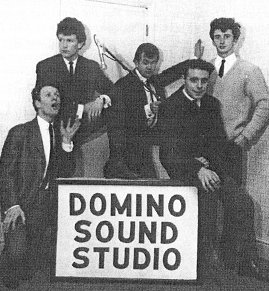
Tremors.
One of the luckiest groups in the area since one of
their number, Andy Maclachlan (far right), was the owner
of the Domino Studio and therefore the group had
readymade recording facilities. The group included John
O'Hara, Clive Mountford, Andy Maclachlan and Les Parker.
(Les Parker) |
"Recording
was Andy 's first love. He was keener to make a success
of that than playing in the group. He works in New
Zealand now for their broadcasting service, I think."
John O'Hara
who was one of the leading singers with the Tremors
also remembers the effect the owner of Domino Studios
had on the group:
"With Andy in
the group we always had the opportunity to record
numbers in his studio before we went on stage with them.
The studio was above his electrical shop, if I remember
right."
"I suppose we
had an advantage over many of the other groups because
we had almost a 'resident' recording studio. It gave me
my first experience of recording and so it helped me
later when I recorded with the Californians."
|
|
The other
recording studio which was used by many of the local
groups was the Grosvenor Studios owned by
Hollick & Taylor. It is still situated in Perry Barr
in Birmingham. John Taylor recalls the hectic
days of the mid-60s:
"Throughout
the years from 1963 to 1966 we had literally hundreds of
groups through our doors. They would either have a
pressing or a demo done. The difference between a demo
and a pressing is that a demo involves a single
recording while a pressing involves a number of records.
A pressing is a vinyl while a one-off used to be called
an acetate. If you are going to make a pressing you make
an acetate as a master which goes away to be plated.
They make two masters and press them. The least number
we would press would be twenty."
"One artist
from Wolverhampton who did quite a bit of work here was
Steve Brett. I think he made the initial contact, asking
for a demo to be made for promotional purposes. I
remember thinking that the demo was good enough to take
to a recording company. It was EMI I believe. They
wanted some recordings doing and they agreed to lease
them from us. In that way, once the record was released
we would receive royalties, as would Steve. One record
he definitely cut here was Sugar Shack."
"Steve was
one of the few with genuine potential and therefore you
wanted to market him and push him with the record
companies. So many of the other artists lacked that
professionalism. The Mavericks also had real ability."
"A recording
session in those days would probably take about eight
hours for four numbers. Nothing like the days or weeks
on end that groups use nowadays. Steve’s session
probably lasted something like that. The group did not
hang about and Steve organised them very well. It was
very much a lead singer and a backing group, or that’s
the impression I had of Steve and the Mavericks. Noddy
Holder was in the group who recorded here."
"There were
others who came through the studio who you felt had
talent and so it proved. Good examples are the Move, the
Fortunes, the Rockin' Berries and the Applejacks. One of
my personal favourites was Mike Sheridan and the
Cheetahs who recorded Mecca here."
|
|
"We did the
recording of the first Brum Beat album on Dial at this
studio but while the tape was excellent, the pressing
was not so good. That album did us some harm in fact."
Pete Bickley
was a member of the Mavericks when Steve Brett
recorded at Grosvenor studios. The making of a record
was a very important event to Pete:
"Steve Brett
already had a recording contract when the Memphis
Cut-Outs became the Mavericks, so we were well chuffed
to be teaming up with someone who was making records. It
meant we would get on to the record as well."
|
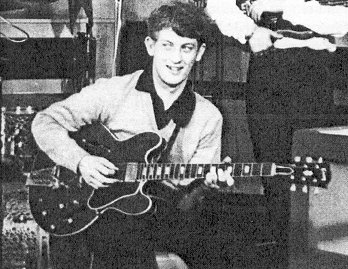
Noddy Holder.
As a member of the Mavericks Noddy Holder was regarded
as a second, supporting voice. It was not long before he
felt that the time was right for him to move on and take
a more leading role in a group. Ultimately that was to
mean as lead singer with Slade. (Steve Brett) |
|
"I loved
those sessions at Hollick & Taylor S. It was everything
I had dreamed about when I first started playing with
the Phantoms and the Cut-Outs. None of the other fellers
were recording so it was very special."
"This was at
the time when groups like the Montanas and the
Californians were not recording. They had not got
contracts but we had. It made you feel really special,
especially as we played on those records, not session
men."
"Some time
later I played with the First Chapter on some of Jason
Cords records with Les Reed but I never rated those
records. I suppose it was because the MOR stuff which
Jason sang was not really my cup of tea. It did not
compare to the excitement I felt when we made those
records at Hollick & Taylor."
Steve Brett and
the Mavericks was not the first Wolverhampton group to
get a recording contract. That honour went to the
Wolves, a group which had previously been known as
the Big Beats. They actually sought and received
permission from the Wolves Football Club to change their
name. Such a publicity manoeuvre was undoubtedly the
brainchild of the group's very shrewd manager, Geoff
Jacobs, as was the securing of a recording contract
from Pye a matter of months after the group's first live
gig. It was the rapidity of the recording contract and
the group's television appearances which really upset
many of the more established local groups.
A member of one
of the town's most popular groups from the 60's who
asked to remain anonymous, describes the feeling at the
time:
"They seemed
to come from nowhere and suddenly they were on For
Teenagers Only and even Thank Your Lucky Stars after
they made their first record. To be honest they were not
that good and I'm willing to bet that if you mentioned
their name to people who were really in the know around
the town in the 60s they would not recall the Wolves as
one of the town’s leading pop groups. Still, they did
get the recording contract which was the one thing most
of us really wanted. Perhaps it’s just jealousy on my
part." |
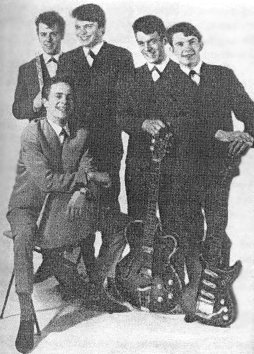
Wolves.
The town's first recording artists. The group possessed
an exceptional manager in Geoff Jacobs who would leave
no stone unturned if it meant greater success for his
group. |
John Eades,
who was the lead guitarist with the group, accepted that
they were not really that good to begin with:
"It was only
when we played alongside some of the better local groups
that we realised our own limitations."
A representative
from Pye saw the Wolves at the Wulfrun Hall on April
18th 1964 and they were signed up soon afterwards. Their
first record called Journey Into Dreams was
released in July. They appeared on Thank Your Lucky
Stars in the August (once again the first
Wolverhampton group to achieve that distinction) and
received a large number of airplays on both Radio
Caroline and Radio Luxembourg.
Their second
single
Now was voted a miss on Juke Box Jury with
Lonnie Donegan announcing that it sounded 'like
millions of other groups '. They were recognised as
the most successful of the local groups in December 1964
when they topped the bill at the Grand Theatre's
Midland Groups Galore. |
|
The group's
manager, Geoff Jacobs, worked tirelessly for them. He
made links with American radio stations and managed to
get fairly regular plays of the group's records on some
of those stations. He even visited the USA on the
group's behalf. He negotiated for them to join
Manchester's Kennedy Street Agency which meant that they
got to work much further afield than just around the
West Midlands. He organised a summer season for the
group in Weymouth. The Wolves made four records in all,
three for Pye and one for Parlophone. Their most
successful record was the Drifters' number Down At
The Club.
In June 1966
Geoff Jacobs produced a breakdown of the group's
activities during the previous year. They had worked 344
days out of 365, playing 138 clubs, 123 days summer
season, 37 pubs, 26 dance halls, I theatre, 6 military
bases,4 night clubs, 8 youth clubs and the Lord Mayor's
Ball in Birmingham. The group was obviously quite
successful.
Several other
groups from the local area were to record during the
60s, including the Montanas, Californians,
'N Betweens (Ambrose Slade), Lady Jayne
and Royaltee, Ides of March and Finders
Keepers, with varying degrees of success.
Jake Elcock
describes his first experience of recording as a member
of the Strangers:
"The first
time I was actually involved in a recording session was
with the Strangers when we played on a Brumbeat LP.
There had been an earlier LP with virtually the same
name. The intention was to produce a sound which was
'distinctively Birmingham' but all we managed to do was
to show how we were merely copying the Mersey sound.
Brum Beat as such never really existed"
"On that
album we played about three numbers including It’s Not
Too Late. The other groups on the record included the
Mountain Kings with Terry Rowley and Dave Lacey and the
Corvettes. It was released by Decca."
Jake was also a
member of the Montanas and participated on some
of their records: |
|
"If the
Montanas had managed to achieve a hit I am certain we
could have sustained it and proved quite a successful
combination. I feel the reason we never actually got the
big hit was the nature of the material. It was just too
'ballady' to be really successful."
"Tony Hatch
wrote a number of the group’s songs and he was a writer
of ballads which the Montanas recorded well but without
that hidden ingredient which is needed to achieve real
success."
Johnny Jones
was the lead singer of the Montanas and he feels
that the group could easily have made it with at least
one of their records, if not more:
"While our
records would not blow you away, they were very
professionally made and performed. If you consider Ciao
Baby or You've Got To Be Loved, which were both radio
hits, they were both excellent examples of that style of
music." |
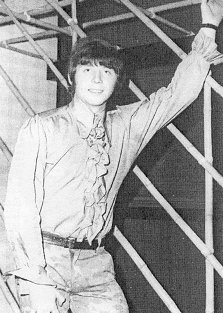
Jake Elcock.
A member of three of the area's leading groups at
various times. He played with the Strangers, Finders
Keepers and the Montanas. (Trevor Westwood) |
|
"You've Got
To Be Loved did make the American Hot 100 and if we had
had the opportunity to go over and plug it then we might
have had a very large hit and the story might have been
very different."
Jake Elcock
recalls the day when the Montanas 'discovered'
that they were in the American charts:
"Like all the
groups who had made a record you would read the trade
papers hoping to find a reference to the record etc.
Anyway, one day one of the lads had a copy of Billboard
and was looking at the American Hot 100 and saw You've
Got To Be Loved by the Montanas in the charts.
Obviously, none of us could believe it. I rang Maurice
King our London manager and he was absolutely
flabbergasted but he found out that indeed we were in
the American charts."
"More s the
pity that we didn't have the chance to go over to
America and plug it and make it a bigger hit. Still,
there weren't too many local groups who made the
American charts in the 60s." |
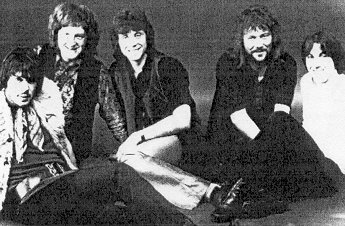
|
Montanas.
Relaxing at home! The group with Jake Elcock
(centre) and Graham Hollis (extreme right)
as members. Notice the move towards
hippiness! (Jake Elcock) |
|
Roger Allen,
as manager of the Montanas, had some of the
responsibility for negotiating record deals. He believes
that the group was just a whisker away from record
success on more than one occasion:
"The Montanas
produced really good records and in the case of Ciao
Baby, You've Got To Be Loved and Let s Get A Little
Sentimental, they had three numbers which, if there was
any justice, deserved to get into the charts. With both
Tony Hatch and Tony Hillier working with the lads they
had top line production and should have had a hit."
|
|
"If there is
one criticism which could be levelled at the Montanas
and some of the other groups who recorded, it was that
they lacked song-writers within the group and therefore
they were too dependent on the work of others. Often
such writing was not directly suitable for the group. If
the group wrote their own stuff, it was quite likely
that the writers would get it just right. That was the
biggest plus for the Beatles and later for Slade with
Jimmy Lea and Noddy Holder writing the stuff."
The vast
majority of the records made by the Montanas were
released on the Pye label between 1965 and 1969. In most
cases observers felt that the group lacked originality
on vinyl while their stage act remained fresh and lively
and sufficiently distinctive to give them an advantage
over many of their contemporaries. John Ogden,
the popular music columnist for the Express & Star
regarded Ciao Baby as the best chance the group
had of chart success because it came nearest to
capturing the professionalism and true sound of the
group, but even that record was not as good as their
stage act: |
| "The Montanas were a really
professional group. Their music was good mainly because
of the ability of Terry Rowley and their mime act was
second to none. However, that could never really be
captured on record. They were more of a cabaret act than
a straightforward pop group. Ciao Baby was perhaps their
best effort on record, but even that did not make the
breakthrough they deserved. Basically their records
lacked adventure and that was probably as much a product
of Tony Hatch as anything. His writing and production
was always safe and often quite timid. The Montanas
needed something more powerful and raunchier but I don't
think they saw it that way." |
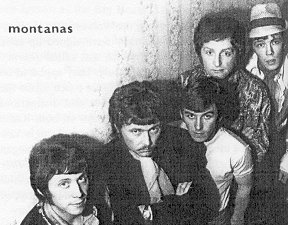
|
Montanas.
Another publicity shot for the Montanas.
(Trevor Westwood) |
|
|
The
Californians was another
local group to see the inside of a recording studio more
than once. They actually made eight records between 1967
and 1969. John O'Hara describes the experience of
recording as follows:
"Going into a
studio was amazing. It was like entering another world.
You lost all sense of time and space. You could be in
there for hours, even days, and you would have no idea
when you came out if it was going to be day or night or
what day it was. I loved it."
"Decca No.1
studio was as big as the Civic Hall. It could house
orchestras of 40 or 50 players. I've been in there
laying a backing track for a record for hours. It all
had to be done live because of Musicians' Union
requirements. Once you got the nod that that was a take,
the musicians would leave and then you would carry on
with the engineers for more hours. It was quite
exhausting but also exhilarating."
"Despite all
the time we took I was never properly satisfied with the
records we made. In many cases I felt the records were
over-produced by A&R men like John Stewart or Irving
Martin."
"Irving
Martin used to send me brown envelopes regularly
containing demos of numbers which he felt we should
consider doing. One I remember him sending was Let’s Go
To San Francisco. When I phoned him about it, he told me
that the Flowerpot Men who had made the demo were
releasing it. They were Carter-Lewis of course. If we
had released it and got a hit, who knows what might have
happened."
Keith Evans,
the drummer with the Californians also recalls the
records which the group made:
"Our records
were good but never brilliant. The nearest we came to
success was with Sunday Will Never Be The Same. It was
one of those radio hits, but never sold enough to make
the charts. The original by Spanky and Our Gang was a
hit in America but it didn't do much in this country
either."
"That record
had a real buzz about it and we felt that it would make
it. It was on radio a lot and it seemed destined for the
charts. We were told to keep our diary empty in case we
needed to plug it on TV etc. We even went down to
Smith’s in town early one morning to check the charts in
the NME. We ripped the packaging off the copies only to
discover that it was about 38 and not in the Top Thirty.
That’s as high as it got." |
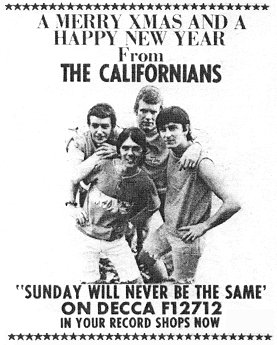
Californians.
Sunday Will Never Be The Same was a reasonably
successful record for the group and received a fair
amount of coverage in the trade papers. |
"One record
we made which to be honest I could not understand us
doing was Congratulations which Cliff Richard was doing
in the Eurovision Song Contest.
We made a
version which was actually cut in the middle of the
night and rushed out within days. Of course, however
good the version, the chance of charting with it against
Cliff was slim."
"I did enjoy
a set of tracks we did for an album called Anvil Flutes
and Capricorn Voices with the Mike Sammes Singers.
The strange
thing was that we never met Mike Sammes. It was all
organised by Irving Martin. The album proved to be quite
popular." |
|
Mick Brookes
also felt that recording was a very special thing in the
60s:
“When I first
started out in the group scene with the Rocking Rustlers
and the Cobras, the one aim was to record. Everyone
wanted to be on disc. When the Californians got the
recording contract it was as if I had achieved
everything. Many of the groups went to the smaller local
studios to make demos but we were actually going to the
big recording studios and making records just like all
the big stars. It was quite awe inspiring."
"When you
were down at the studios, it was actually being involved
with large orchestras and ace musicians which I enjoyed
most. We did not need to play on the records, just
sing."
"We made a
version of Silence Is Golden with Tony Hatch. I remember
the booth for that recording was up in the air so you
could not really see him. Anyway, he told us not to
bother with the recording since it was not chart
material. A little while afterwards, the Tremeloes had a
No.1 with it. Such is life!" |
|
Californians. The group
are down in the orchard to plug their record of
Golden Apples. |
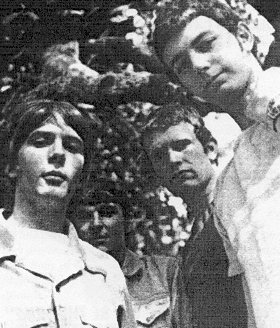 |
 |
 |
 |
Return to
the
previous page |
Return to
the Contents |
Proceed to
the
next page |
|